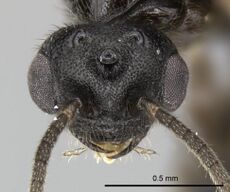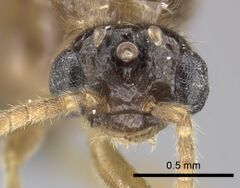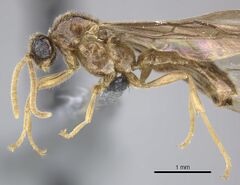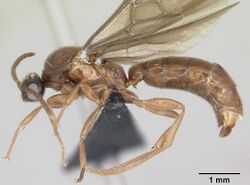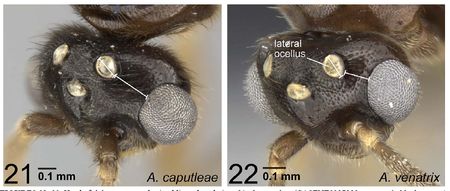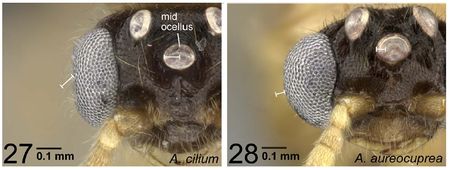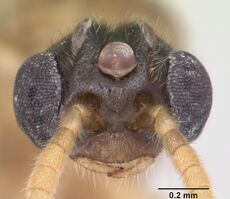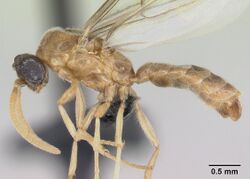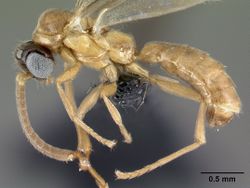Key to Adetomyrma males
This male key is based on: Yoshimura, M. & Fisher, B.L. 2012. A revision of the Malagasy endemic genus Adetomyrma (Hymenoptera: Formicidae: Amblyoponinae). Zootaxa, 3341, 1-31.
You may also be interested in
1
- Parameres broadly overlapping dorsally, almost along the whole length of basimere (Fig 13). Posterodorsal portion of paramere with a distinct, flattened, needle-like projection, and with a deep notch separating the projection and paramere (Fig 13) . . . . . Adetomyrma bressleri
- Parameres not or sometimes narrowly overlapping dorsally on small part of basimere (Fig 14). Posterodorsal portion of paramere without needle-like projection, or without a deep notch separating the projection and paramere (Fig 14) . . . . . 2
2
return to couplet #1
- Posterior portion of paramere narrow, forming a blunt, needle-like projection (Fig 15). Large species (WL>2.1mm) . . . . . Adetomyrma cassis
- Posterior portion of paramere wide, not forming a needle-like projection (Fig 16). Small to medium species (WL<2.1mm) . . . . . 3
3
return to couplet #2
- Notaulus distinctly impressed on mesoscutum (Fig 17). Body color usually black to blackish brown, rarely brighter. Small species (WL 0.79–1.28mm) . . . . . Adetomyrma goblin
- Notaulus not impressed on mesoscutum (Fig 18). Body color usually brown to yellow, sometimes darker. Medium to small species (WL 1.03–2.03mm) . . . . . 4
4
return to couplet #3
- Paramere with a broad, distinct lobe posterodorsally (Fig 19). Subpetiolar process small, but distinct. Palpal formula 2,2 . . . . . Adetomyrma caudapinniger
- Paramere without distinct lobe posterodorsally (Fig 20). Subpetiolar process distinct or indistinct. Palpal formula usually 3,3 rarely 2,3 . . . . . 5
5
return to couplet #4
- Lateral ocellus relatively small and distant from eye; distance between them more than 1.5x maximum diameter of lateral ocellus (Fig 21). Subpetiolar process developed, with few hairs. Body color brown . . . . . Adetomyrma caputleae
- Lateral ocellus relatively large and close to eye; distance between them less than 1.5x maximum diameter of lateral ocellus (Fig 22). Subpetiolar process variable, but usually poorly developed and often without hairs. Body color brown to yellow . . . . . 6
6
return to couplet #5
- Distance between lateral ocelli about same length or less than maximum diameter of mid ocellus. Distance between lateral ocellus and eye 0.5x or less than maximum diameter of lateral ocellus (Fig 23). Hairs on compound eye more than 0.33x of horizontal diameter of mid ocellus. Anterior face of mesofemur with only subdecumbent short hairs (Fig 25) . . . . . Adetomyrma clarivida
- Either distance between lateral ocellus distinctly longer than maximum diameter of mid ocellus, or distance between lateral ocellus and eye distinctly longer than 0.5x length of maximum diameter of lateral ocellus (Fig 24), or hairs on compound eye distinctly shorter than 0.33x length of horizontal diameter of mid ocellus, or anterior face of mesofemur with short and dense long hairs (Fig 26) . . . . . 7
7
return to couplet #6
- Hairs on compound eye longer than 0.5× length of horizontal diameter of mid ocellus (Fig 27). Subpetiolar process developed . . . . . Adetomyrma cilium
- Hairs on compound eye shorter than 0.25× length of horizontal diameter of mid ocellus (Fig 28). Subpetiolar process not developed . . . . . 8
8
return to couplet #7
- Body color uniform dark brown. Parapsidal line clearly impressed, usually highlighted with darker pigment . . . . . Adetomyrma venatrix
- Body bicolored, head brown and the other body parts yellow. Parapsidal line usually unclear, sometimes weakly impressed, without pigmentation . . . . . Adetomyrma aureocuprea






